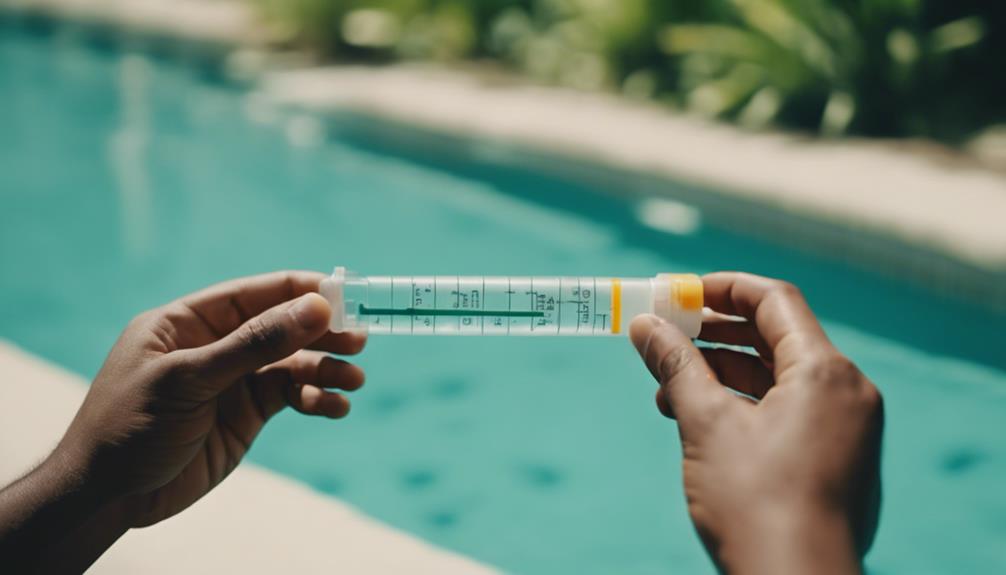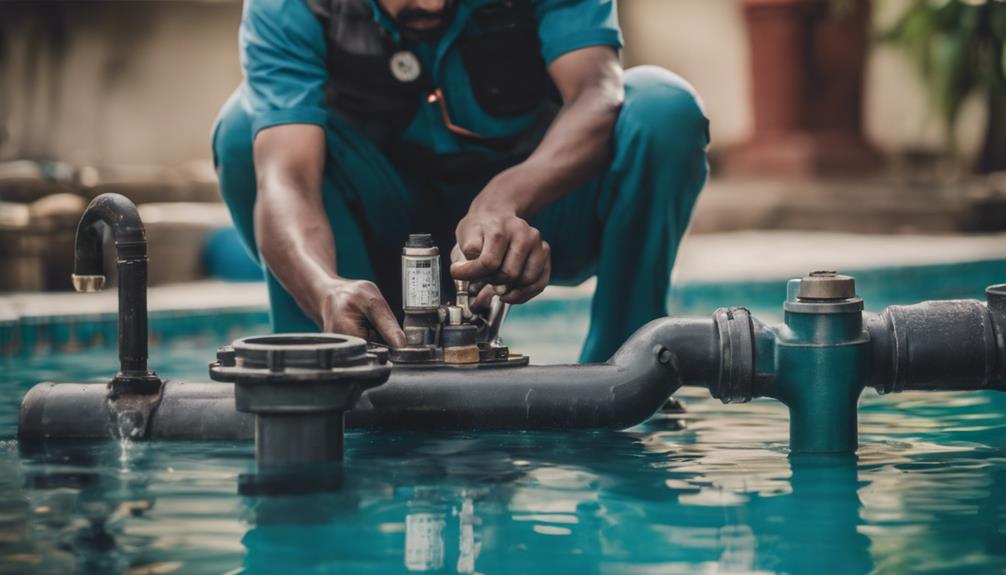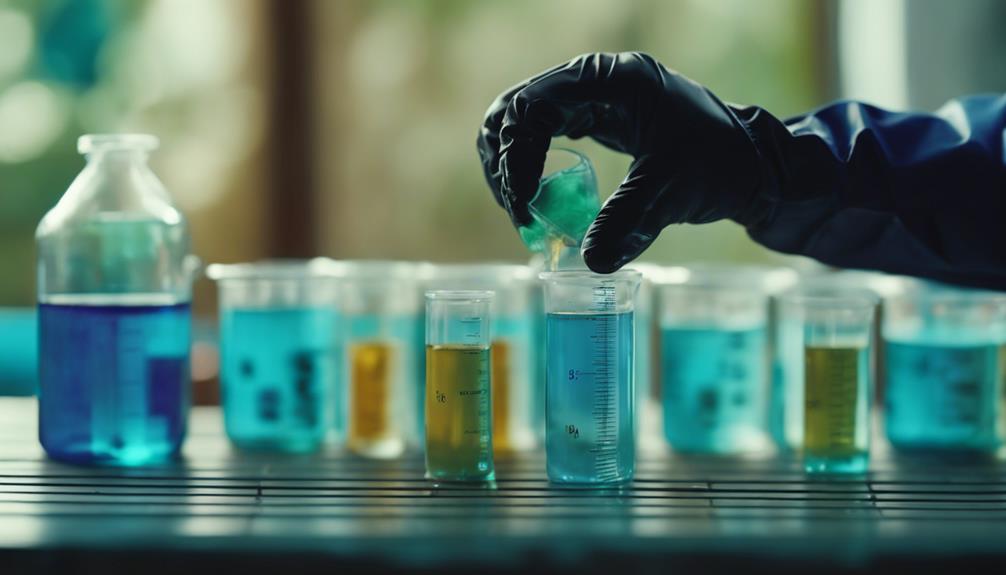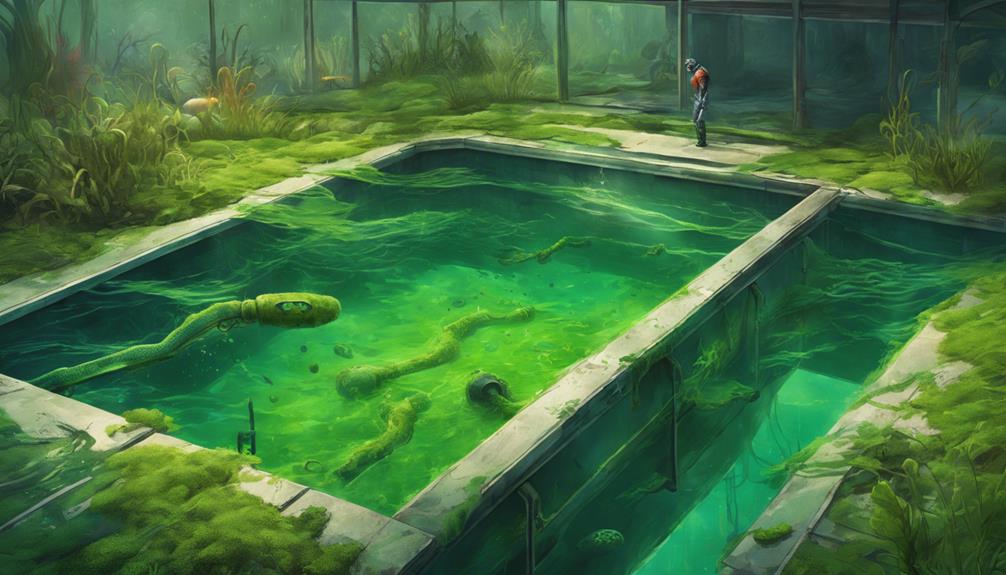To effectively maintain your pool in India, ensure you have essential equipment such as a saltwater system, pool vacuum, skimmer basket, and proper chlorine tools. Regularly conduct water tests using reliable kits to check chlorine, pH levels, and more. Address pool contaminants promptly with the right chemicals. Regularly inspect and clean the pump and equipment for optimal performance. Use proper cleaning techniques like skimming, vacuuming, and brushing to keep the pool clean. Remember to balance pool chemicals effectively for water clarity. Additionally, follow off-season maintenance tips to protect the pool during colder months. Mastering these practices will ensure a well-maintained pool for your enjoyment.
Key Takeaways
- Consider using a saltwater system for automatic chlorine maintenance.
- Regularly test and adjust water chemistry levels to ensure clarity.
- Address pool contaminants promptly with appropriate chemicals.
- Inspect and maintain pool equipment for optimal performance.
- Store pool equipment in a dry, well-ventilated area to prevent damage.
Essential Pool Maintenance Equipment
To effectively maintain your pool in India, essential pool maintenance equipment is required for proper sanitation and cleanliness. Pool equipment such as chlorine administration tools plays an important role in ensuring a safe and clean swimming environment.
Consider installing a saltwater system for automatic chlorine maintenance, reducing the need for manual monitoring. This system helps in keeping the chlorine levels consistent, which is essential for preventing the growth of harmful bacteria.
Additionally, regular use of a pool vacuum cleaner is necessary for efficient debris removal, keeping the pool free from dirt and contaminants. It's also important to have a skimmer basket and brush for surface cleaning, as these tools help in maintaining the pool's cleanliness and clarity.
Regular Water Testing Procedures

For effective maintenance of your pool in India, ensuring regular water testing procedures is crucial to monitor and maintain the water quality.
Use a reliable test kit to check total chlorine, pH, alkalinity, calcium hardness, and cyanuric acid levels in your pool water. Consider investing in a ColorQ Pro 7 test kit for accurate and precise water testing results.
Test salt levels in saltwater pools regularly to guarantee proper maintenance. It's essential to monitor and maintain proper water chemistry weekly, monthly, and quarterly for the best pool sanitation.
Additionally, check for any unusual occurrences like algae growth or dead animals during water testing to address issues promptly. Remember to clean the filter every time you conduct water testing to ensure efficient filtration and circulation.
Identifying and Dealing With Pool Contaminants

Detecting and managing pool contaminants is essential for maintaining water quality and ensuring a safe swimming environment in your pool in India. Algae, bacteria, and other common contaminants can lead to cloudy water, foul odors, and skin irritation if not addressed promptly.
To clean the pool effectively, utilize pool testing kits to pinpoint the specific contaminants present. Once identified, treat the pool with appropriate chemicals like chlorine, algaecides, and clarifiers to eliminate the contaminants.
Regularly shocking the pool is also vital to kill bacteria and algae, ensuring water clarity. By staying vigilant and addressing pool contamination promptly, you can create a clean and safe swimming environment for you and your family.
Pump and Equipment Inspection Guide

Begin by inspecting and cleaning the pump basket weekly to maintain peak pump performance and water circulation in your pool in India. This simple task can prevent debris from clogging the pump and guarantee efficient water flow.
Additionally, checking for any debris near the impeller is vital to avoid blockages that could hinder the pump's operation. Always remember to fill the pump with water before starting it to prevent any damage to the motor.
Regular maintenance of the pump lid o-ring is also essential to prevent leaks and maintain a tight seal, ensuring the pump operates effectively.
Lastly, regularly inspect and adjust the timer settings on your pump to control filtration and circulation schedules efficiently. By following these steps, you can keep your pool pump and equipment in top condition, allowing your pool vacuum to function at its best and keeping your pool water clean and inviting.
Proper Pool Cleaning Techniques

Wondering how to maintain a sparkling clean pool in India? Utilizing skimmers is essential to collect debris from the pool surface, preventing clogs in the filtration system. Make sure to regularly vacuum the pool floor to eliminate dirt, leaves, and other debris, ensuring peak cleanliness.
Additionally, weekly brushing of the pool walls is vital to ward off algae growth and uphold a clean appearance. To guarantee efficient water circulation and filtration, it's important to clean the pool filter on a weekly basis.
Furthermore, for pristine water clarity and to avert bacterial growth, daily monitoring and adjustment of pH levels are necessary. By incorporating these proper pool cleaning techniques, you can uphold a visually appealing and hygienic pool environment.
Balancing Pool Chemicals Effectively

To maintain a safe swimming environment, it's essential to balance your pool chemicals properly. Regularly test the water using a reliable kit and adjust chemical levels accordingly to guarantee pH levels between 7.2-7.6, adequate alkalinity between 80-120 ppm, and calcium hardness between 200-400 ppm for best effectiveness.
Chemical Safety Measures
When balancing pool chemicals effectively, always prioritize safety by wearing appropriate protective gear and following manufacturer's instructions meticulously.
Here are three essential chemical safety measures to keep in mind:
- Proper Storage: Store pool chemicals in a cool, dry place away from sunlight. This helps prevent reactions and maintains their effectiveness over time.
- Essential Gear: Always wear gloves and goggles when handling pool chemicals to prevent skin irritation and eye damage. Safety gear is vital to safeguard yourself during chemical handling.
- Follow Instructions: Accurately measure and add pool chemicals following the manufacturer's guidelines. This ensures proper dosing, prevents overuse, and helps maintain a safe swimming environment.
Testing Frequency Guidelines
To effectively maintain your pool's chemical balance, make sure to regularly test total chlorine, pH, alkalinity, calcium hardness, and cyanuric acid levels on a weekly basis. Testing these parameters every week is essential to guarantee that your pool water remains safe and clean for swimming.
Consider using a ColorQ Pro 7 test kit for precise and accurate results, making it easier to monitor and adjust chemical levels accordingly. Additionally, if you have a saltwater pool, remember to monitor salt levels consistently to support effective chlorine production.
While weekly testing is important, don't forget to perform more thorough water chemistry tests on a monthly and quarterly basis to uphold a hygienic swimming environment.
Moreover, it's advisable to regularly inspect and adjust pump and equipment settings to guarantee efficient pool maintenance and ideal chemical balance. By following these testing frequency guidelines diligently, you can enjoy a well-balanced pool that's both safe and enjoyable for all swimmers.
Corrective Action Steps
For successful balancing of pool chemicals, make sure you promptly address any imbalances detected during your regular testing routine. Properly managing the chemical levels in your pool is essential for maintaining water quality and guaranteeing a safe swimming environment.
Here are three essential corrective action steps to help you effectively balance pool chemicals:
- Adjust Chlorine Levels: If your chlorine levels are too low, bacteria and algae can thrive, leading to water contamination. Increase chlorine by adding the appropriate amount of shock treatment. Conversely, if chlorine levels are too high, dilute the water by adding fresh water to lower the concentration.
- pH Regulation: Imbalanced pH levels can cause skin and eye irritation. Use pH increaser or decreaser to adjust the pH level accordingly. Aim for a pH level between 7.2 and 7.6 for the best swimming conditions.
- Clean or Replace Filters: To ensure proper circulation and filtration, clean or replace your pool filters every week. Clogged filters can impede water flow, leading to ineffective chemical distribution and poor water quality. Regular maintenance of filters is vital for overall pool health and chemical balance.
Off-Season Pool Maintenance Tips

Before securing your pool for the off-season, make sure that any leaks, damage, or cracks are addressed to prevent further deterioration.
Lower the water level and cover the pool with a sturdy plastic sheet to shield it from debris accumulation.
Regularly inspect the pool cover for tears or cuts to maintain its protective function during the off-season.
Winter Pool Care
Address leaks, damage, and cracks in your pool before closing it for the off-season in India to prevent any potential major issues. Lower the water level or empty it before covering the pool with a firm plastic sheet to protect it from debris and damage.
Regularly check the pool cover for tears or cuts to guarantee it remains effective in safeguarding the pool during the winter months. Taking prompt action to repair any damage or issues during the off-season can help prevent costly repairs and prolong the life of the pool.
Proper off-season maintenance practices in India are essential to make sure that your pool remains in good condition and ready for use when the warmer months return.
- Inspect the pool cover regularly for tears or cuts to maintain its effectiveness.
- Lower or empty the water level before covering the pool to prevent damage.
- Address any leaks, damage, or cracks before closing the pool for the off-season.
Equipment Storage Recommendations
Regularly store your pool equipment in a dry, well-ventilated area away from direct sunlight to prevent damage. It's important to keep your pool equipment safe during the off-season to make sure it functions properly when you reopen your pool.
Store pool chemicals in a cool, dry place and away from any flammable materials to prevent accidents. Cover pumps and filters to protect them from dust and debris, which can affect their performance. Before storing chlorinators, drain and clean them to prevent clogs and corrosion, guaranteeing they're ready for use next season.
Additionally, store pool covers in a clean, dry area to prevent mold and mildew growth, which can damage the cover and impact water quality. By following these equipment storage recommendations, you can prolong the lifespan of your pool equipment and maintain a clean and safe swimming environment for your family.
Frequently Asked Questions
How to Maintain a Swimming Pool in India?
To maintain a swimming pool in India, you need to focus on regular cleaning with skimmers, nets, and filters to remove debris and maintain water clarity. It's important to monitor and adjust pH levels daily, add chemicals like chlorine, and perform shock treatments.
Proper maintenance of pool equipment such as pumps and filters is essential for efficient operation. Testing and balancing water chemistry regularly is key to pool sanitation. Stick to a strict cleaning routine to prevent algae growth and guarantee a clean, safe pool.
Is It Safe to Use Swimming Pools in India?
Swimming pools in India can be made safe if proper maintenance practices are followed. Regular testing of alkalinity, pH, and calcium hardness, along with chlorine administration, is essential. Installing a saltwater system can automate chlorine maintenance.
Following a strict cleaning and chemical routine guarantees pool safety. By adhering to these protocols, swimming pools in India can provide a safe and enjoyable experience for users.
How Often Does Swimming Pool Water Change in India?
In India, swimming pool water change frequency varies based on factors like pool size, usage, and maintenance practices. Typically, pools should ideally have water changed every 3-5 years for best water quality. However, regular testing, treatment, filtration, chemical balancing, and cleaning can extend the time between water changes.
Consulting with a professional pool maintenance service can provide personalized advice on the most suitable water change frequency for your specific pool conditions.
What Regular Maintenance Should Be Done on a Pool?
To maintain your pool effectively, ensure regular cleaning of skimmers. Monitor and adjust pH levels, and perform weekly brushing of pool walls.
Keep a close eye on water levels to prevent evaporation and maintain proper levels.
Maintain water quality through chemical upkeep. This includes shocking the pool, adding chlorine, and balancing water regularly.
Equipment maintenance is essential too. This involves checking and emptying skimmer baskets, vacuuming, and cleaning the filter following instructions.
Consistent maintenance routines minimize costs and prevent future repairs.
What are the key maintenance tips for a newly built swimming pool in India?
When it comes to swimming pool construction in india, it’s essential to follow key maintenance tips for a newly built pool. Regular cleaning, proper chemical balance, and regular inspections are crucial to ensure the longevity and functionality of the pool in the Indian climate.
What Are the Best Maintenance Tips for a Newly Built Swimming Pool in India?
When building a swimming pool in india, it’s essential to follow the best maintenance tips. Regularly check the pH and chlorine levels. Clean the pool filters and skimmers to ensure proper circulation. Keep the pool area free from debris and regularly inspect for any leaks or damage to the structure.
What are the maintenance requirements for a newly built swimming pool in India?
When building a swimming pool in india, it’s crucial to prioritize regular maintenance. This includes checking and balancing the water chemistry, inspecting and cleaning the pool filters, and maintaining the pool pump and other equipment. Additionally, regular brushing and vacuuming of the pool walls and floor are essential to keep the pool clean.
What Are the Essential Maintenance Tips for a Newly Built Swimming Pool in Nepal?
When considering the essential maintenance tips for a newly built swimming pool in Nepal, it’s important to be mindful of the ongoing costs. Proper maintenance, including regular cleaning, pH level checks, and equipment inspections, can help reduce the long-term building a swimming pool costs and ensure the pool stays in optimal condition.
Conclusion
To sum up, maintaining your pool in India requires diligence and attention to detail. By regularly testing water quality, identifying and addressing contaminants, inspecting equipment, and properly balancing chemicals, you can guarantee a safe and clean swimming environment for you and your family.
Following these maintenance tips won't only prolong the life of your pool but also provide a visually appealing and enjoyable experience for all. Remember, a well-maintained pool is a source of relaxation and enjoyment in your home.










